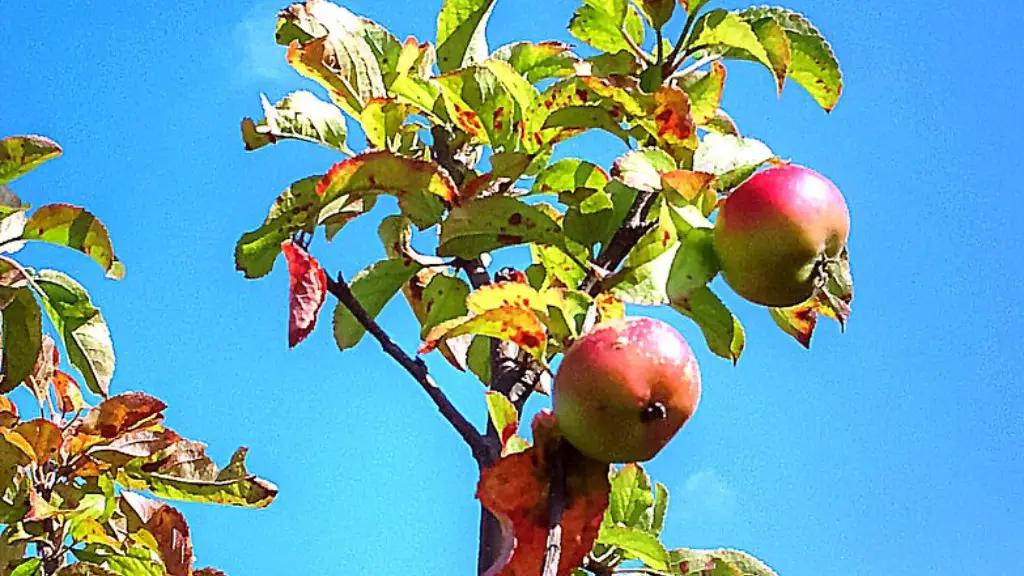The story of George Washington chopping down his father’s cherry tree has long been a part of American lore. It came to symbolize Washington’s honesty and integrity, and many still view it as such today. But while the story has long been part of the national narrative, the truth behind it is much more complicated than the tale suggests.
The story of Washington and the cherry tree began with the English biographer, Mason Locke Weems. He wrote, in his book “The Life of Washington,” that when Washington was six years old he was given a hatchet to play with, and that he soon began to use it to chop down his father’s cherry tree. When his father asked him who had done it, Washington, he wrote, replied truthfully “I cannot tell a lie, I did it with my little hatchet.”
The story, however, is almost certainly a fabrication. It appears that Weems invented it in an effort to teach a moral lesson to young readers. It is possible, however, that there is some truth to the story. Weems had known Washington’s mother and step-grandfather, and according to some reports he may have heard the story from them.
One thing that is certain is that the story has been very influential in American culture. It has been used countless times to illustrate Washington’s exemplary character, and that of other leaders. It has also been used to push a “boy-scout” version of patriotism in which citizens always strive to tell the truth, no matter the cost.
Though the story of Washington and the cherry tree may have been invented, the core values of truthfulness, honesty, and personal integrity that it symbolizes remain essential. These qualities are what made Washington and many other early political leaders great, and they remain just as important today.
Impact on US Law
The story of Washington’s honesty has had a lasting impact on the laws of the United States. In fact, the US Supreme Court cited the story in a ruling about false statements made by a politician. In the case of United States v. Alvarez, the court said that Washington’s conduct was “proper to be memorialized” and that it “impliedly supports a conclusion that knowing falsehoods, in some circumstances, can be penalized”.
In other words, while the story itself may have been invented, it still has a powerful influence on the laws of the United States. The Supreme Court held that knowingly lying can be punishable by law, even if they did not cite Washington as the inspiration for their ruling.
The story, then, though not historically accurate, still has a powerful effect on American culture and laws. It can still be used to teach citizens the importance of honesty and truthfulness, and it is a constant reminder of the virtues that a leader must have.
Educational Perspective
The story of the cherry tree has, unsurprisingly, been a mainstay of American elementary education. Many school textbooks, especially those intended to teach American history, include the story and use it to help students understand the values and character of Washington.
It has also been used as a tool of propaganda, particularly during the Cold War. In the 1950s, for example, teachers were encouraged to use the story as a way to contrast America’s honesty with the regime of the Soviet Union and its leaders.
Yet despite its wide use in the classroom, the fact that it is likely a fabrication is rarely acknowledged. This can have a damaging effect on young students, who may begin to view history through a distorted lens. It is essential, then, for teachers to explain to their students the origin of the story and its factual accuracy (or lack thereof).
The lesson of Washington and the cherry tree, then, can still be valuable if students are taught the right way. It is a way to teach important values such as honesty, integrity, and truthfulness. But it also serves as a reminder that even stories that are part of the national narrative may not be true and should be taken with a grain of salt.
Religious Impacts
The story of Washington and the cherry tree has also been used to illustrate Christian values. Many preachers and religious organizations have used it to demonstrate the importance of being honest with God and also with one’s family. It also serves as a reminder to children of the consequences of telling a lie. The story, then, has had a profound impact on religious education as well.
The story has also been viewed in a more positive light by some religious groups. These groups have argued that the story is not about presenting a moral lesson, but rather about the power of redemption. After all, Washington was forgiven for his transgression, and the story can serve as a reminder of the power of forgiveness.
The story, then, is a powerful reminder of both the importance of honesty and the power of forgiveness. It has been used by both religious organizations and secular institutions to remind citizens of these two essential values.
George Washington Legacy
The story of Washington and the cherry tree has been so widely repeated that it has become part of the national narrative. It has been used countless times to illustrate the character of not only Washington, but of other leaders as well. It has also become a symbol of the values and principles upon which the United States was founded.
Washington himself was well aware of the power of the story and used it to his advantage. He often concluded speeches with anecdotes about the cherry tree in order to remind his listeners of the moral lesson it conveyed. He also refused to deny the story when asked about it directly.
The legacy of the story is an important part of Washington’s own legacy. It speaks to his exemplary character and ability to lead by example, and it serves as a reminder of the values he held dear. It also serves as a reminder that truthfulness and integrity are essential qualities of leadership, both in Washington’s time and today.
Public Perception
Despite the fact that the story is almost certainly a fabrication, it has had a powerful influence on the way Americans view honesty and integrity. It has been used to illustrate the character of Washington and other political leaders and to remind citizens of their duty to uphold the values of truthfulness and honesty.
For many, the story has become an integral part of American culture. It is often taught in schools, used in political debates, and invoked in sermons. Indeed, the story has become the main symbol for truthfulness and integrity in the minds of many Americans.
The fact that the story is almost certainly a fabrication does not detract from its power and influence. The values it portrays are as important today as they ever were, and the story still serves as a reminder of the qualities necessary for strong and ethical leadership.
Truth behind the Myth
The story of Washington and the cherry tree has had a powerful impact on American culture and has become an integral part of the nation’s history. While the story itself is almost certainly a fabrication, the core values of truthfulness, honesty, and personal integrity that it symbolizes still remain essential.
The story has been used to teach citizens the importance of honesty and truthfulness, and as a reminder of the qualities that are necessary in a leader. It has also had a strong influence on American laws and religious education.
Though the story of Washington and the cherry tree is likely apocryphal, it still has a powerful effect on American culture. It can still be used to remind citizens of the importance of truth and personal integrity, and it serves as a reminder of the values which Washington held dear and strived to exemplify.



